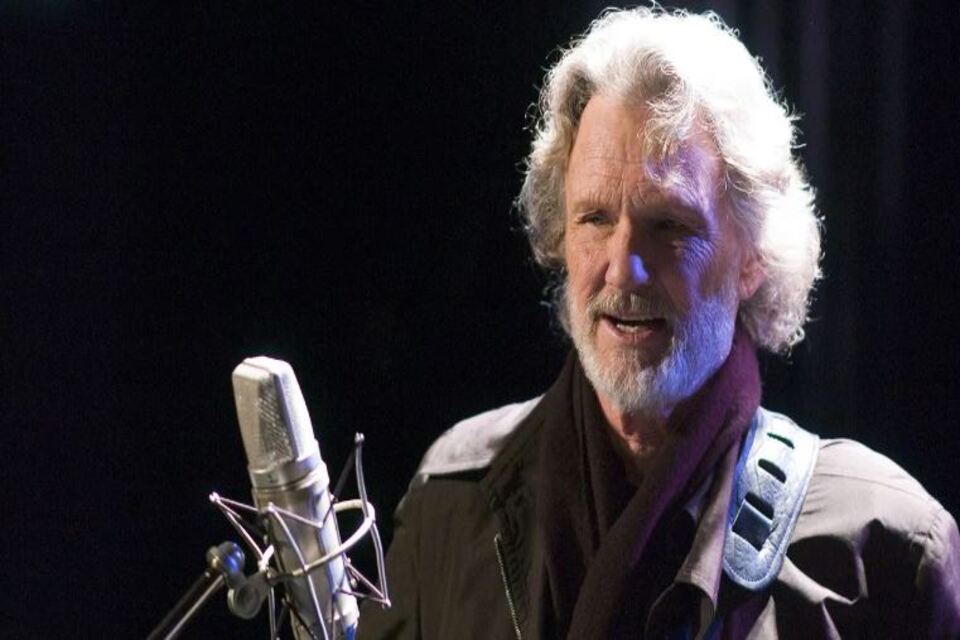Kris Kristofferson, the soulful country music superstar who wrote “Me and Bobby McGee” and “Help Me Make It Through the Night,” performed with the supergroup The Highwaymen and made audiences swoon in Alice Doesn’t Live Here Anymore and A Star Is Born, has died. He was 88.
Kristofferson died Saturday at home in Maui, Hawaii, his family announced. “We’re all so blessed for our time with him,” they said in a statement. “Thank you for loving him all these many years, and when you see a rainbow, know he’s smiling down at us all.”
A native of South Texas, Kristofferson starred in football and rugby and won a Golden Gloves boxing tournament while attending Pomona College in California; earned a Rhodes Scholarship to study literature abroad; and piloted helicopters in the U.S. Army.
He threw away a career in the military and moved to Nashville, where he worked as a janitor at Columbia Records and watched as Bob Dylan recorded his seminal 1966 album Blonde on Blonde. It took Kristofferson many months before his music career finally took hold.
His drifter ballad “Me and Bobby McGee” was initially recorded by Roger Miller in 1969 before Janis Joplin made it a rock classic, her throaty version topping the Billboard Hot 100 in 1971, not too long after she died of a heroin overdose.
Kristofferson also performed “Help Me Make It Through the Night” on his 1970 self-titled album, but it was Sammi Smith’s version that became one of the most enduring singles in the annals of country music, vaulting as high as No. 8 on the Billboard chart. (A couple years ago, Bono told THR‘s Scott Feinberg that he thinks “Help Me Make It Through the Night” is the greatest song of all time.)
Kristofferson said he wrote the song after reading a quote from Frank Sinatra, who, when asked what he believed in, replied, “Booze, broads or a bible…whatever helps me make it through the night.”
Kristofferson received the best country song Grammy Award for writing “Help Me Make It Through the Night,” and he added trophies in 1973 and 1975 for his duets with then-wife Rita Coolidge on “From the Bottle to the Bottom” and “Lover Please,” respectively (he authored those tunes as well).
Kristofferson also wrote a morose song about a hangover, “Sunday Mornin‘ Comin‘ Down,” that was the Country Music Association’s song of the year in 1970 and a big hit for Ray Stevens and then Johnny Cash; “The Taker,” notably recorded by Waylon Jennings; “For the Good Times,” made popular by Ray Price and named song of the year by the Academy of Country Music in 1971; and “Please Don’t Tell Me How the Story Ends,” which Ronnie Milsap made his own.
“The reason I came to Nashville was that the lyrics here were the best that I could identify from my experience,” he told American Songwriter magazine in 1994. “The people that were writing the closest thing to white man’s soul music were country writers. They were writing about real life — about sex and cheating and drinking and losing and stuff like that. I figured the most honest you could be would be the most successful.”
In 1985, Kristofferson, singing and strumming his trusty Gibson guitar, teamed with buddies Cash, Jennings and Willie Nelson to form The Highwaymen, and the four “outlaws” released three albums through 1995 and thrilled live audiences before Jennings and Cash succumbed to poor health.
Describing his weathered, whiskey-soaked voice, Esquire wrote in 2014: “Kristofferson’s never quite seemed to take flight, but his being stuck down here with the rest of us mortals made him that much more one of us. It’s a voice held together by scars, and the songs that he made up out of his imagination always had the benefit of being founded on some kind of truth, like that voice in your ear you just know is right.”
The charismatic Kristofferson was inducted into the Songwriters Hall of Fame in 1985, entered the Country Music Hall of Fame in 2004 and was given the Grammy Lifetime Achievement Award in 2014. He received an Academy Award nomination for best score in 1985 for Alan Rudolph’s Songwriter, in which he starred as singer Blackie Buck opposite Nelson in the Nashville-set tale.
Starting with Dennis Hopper’s The Last Movie (1971), Kristofferson brought his manly, craggy persona to the fore in such films as Sam Peckinpah’s Pat Garrett & Billy the Kid (1973), the Michael Cimino debacle Heaven’s Gate (1980) and, as a corrupt sheriff in John Sayles’ Lone Star (1996).
He starred as love interests for Oscar-winner Ellen Burstyn in Martin Scorsese’s Alice Doesn’t Live Here Anymore (1974), for Sarah Miles in The Sailor Who Fell From Grace With the Sea (1976) and — as alcoholic, has-been singer John Norman Howard — for Barbra Streisand in the remake of A Star Is Born (1976).
In an Instagram post Sunday, Streisand wrote: “The first time I saw Kris performing at the Troubadour club in L.A. I knew he was something special. Barefoot and strumming his guitar, he seemed like the perfect choice for a script I was developing, which eventually became A Star Is Born.
“In the movie, Kris and I sang the song I’d written for the film’s main love theme, ‘Evergreen.’
“For my latest concert in 2019 at London’s Hyde Park, I asked Kris to join me onstage to sing our other A Star Is Born duet, ‘Lost Inside of You.’ He was as charming as ever, and the audience showered him with applause. It was a joy seeing him receive the recognition and love he so richly deserved.”









